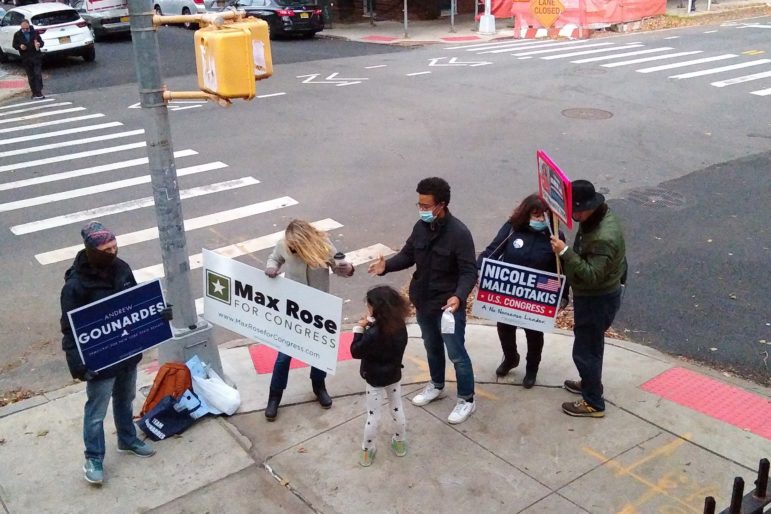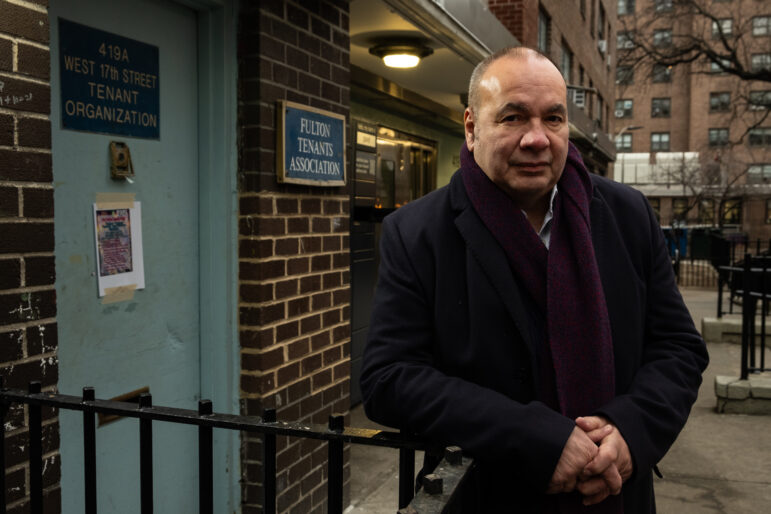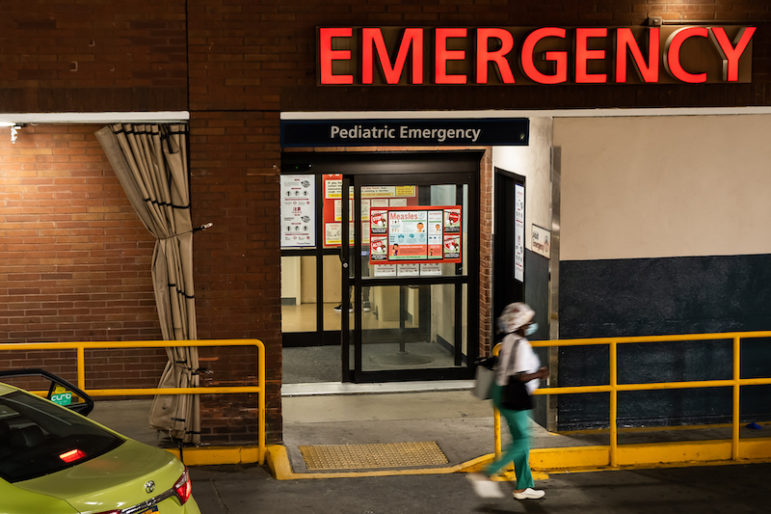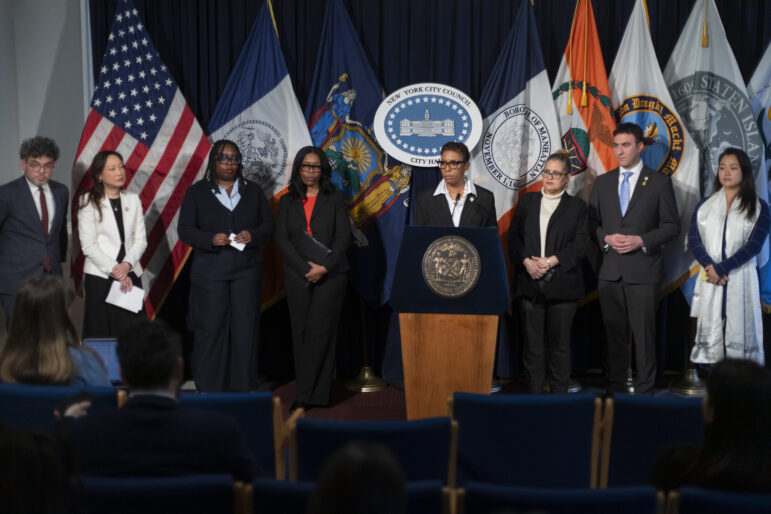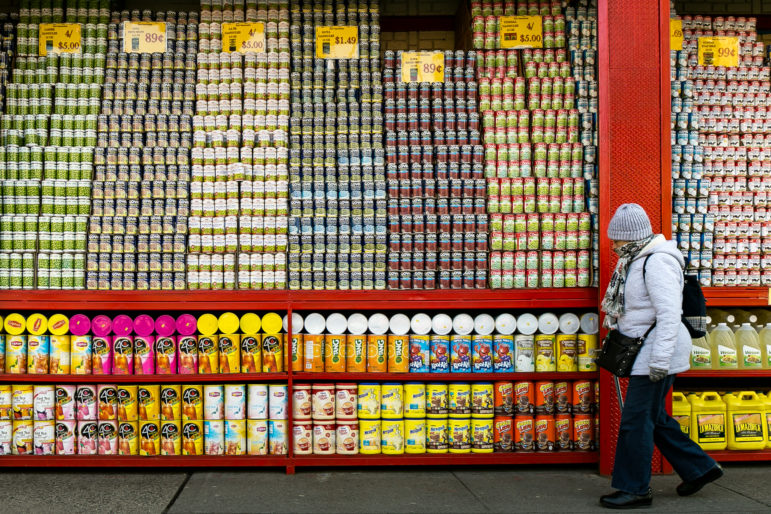Staten Island occupies the bulk of the 11th Congressional district, where Rep. Max Rose, a Democrat, is trying to hold on to the seat he won in 2018 against a strong challenge by Assemblywoman Nicole Malliotakis.
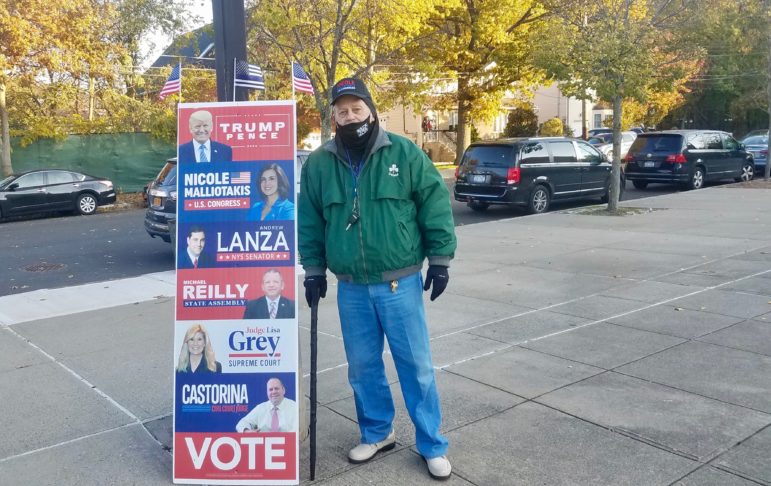
Jarrett Murphy
Ken McIntyre, a GOP volunteer and 77-year-old Staten Island native, posted outside P.S. 6 in Tottenville on Election Day.In the early morning cold outside P.S. 6 on Page Avenue in Staten Island, some 50 people stood in line waiting to vote 10 minutes before the polls opened on Election Day. It was a longer queue than Ken McIntyre, a volunteer campaigning for Republican candidates on a corner near the school, had seen in the 30 years he’s lived in Tottenville at the base of Staten Island, the battleground borough of Election 2020 in New York City.
The island occupies the bulk of the 11th Congressional district, where Rep. Max Rose, a Democrat, is trying to hold on to the seat he won in 2018 against a strong challenge by Assemblywoman Nicole Malliotakis. It also comprises the lion’s share of the 64th Assembly district, which Malliotakis is vacating and where Democrat Brandon Patterson, an aide to Sen. Diane Savino, is hoping to beat Republican prosecutor Michael Tannousis. A judicial race on the borough is also unusually feisty, and no place in New York City will generate more votes for President Donald Trump than the southernmost borough.
At least 100 people voted at P.S. 6 during the initial morning rush, according to Samantha Kennedy, the poll site supervisor—and that’s despite the fact that early voting got plenty of business there. Just before 7:30 a.m., a steady stream flowed into the site, a large school situated across from a well-appointed Little League field.
Earlier in the morning, the supervisor at another polling place in southern Staten Island, a Methodist church located mere blocks from the waters of Arthur Kill, said only 20 or so voters had shown up during the first 45 minutes of voting in the two election districts housed there. She expected Election Day turnout to be lower since many voters cast their ballots early or by mail.
But Kennedy expected strong turnout all day at P.S. 6, whose gymnasium houses five election districts. Kennedy said there had been minor technical glitches earlier in the day—some of the voter lists were not syncing properly—but they had been resolved.
Given Republicans’ avowed concerns about voting fraud and Democrats’ worries about voter intimidation, one question on Election Day is whether the parties or their campaigns will mount more aggressive poll-watching efforts this year than typically occur. There was no sign of such a presence at either Tottenville site on Tuesday morning. “I had a couple [poll watchers] during early voting,” Kennedy said. “I’m not sure which campaign they came from, to be honest.”
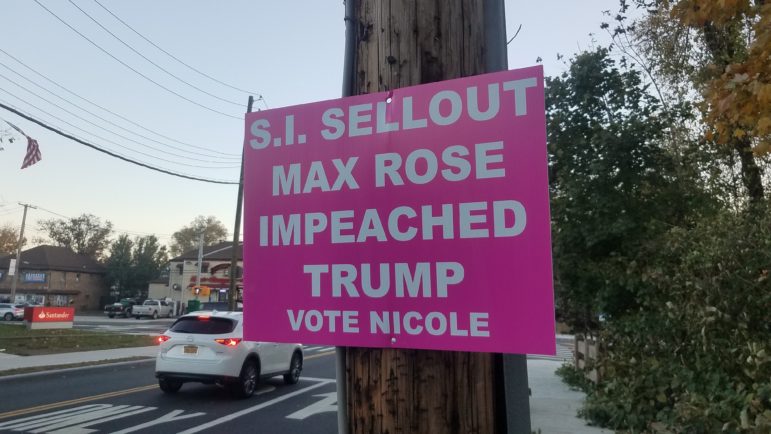
McIntyre, wearing a Malliotakis for Congress hat, a pro-police face mask and a scarf against the chill, said he expected to be relieved from his post at 9 a.m. He joked that he ended up an Election Day volunteer, he said, because “I made the mistake of making a commercial with her.” (He appears in the ad “Work Boots.”)
“She’s the kind of woman that, not only is she attractive, she is highly intelligent. When she talks, it’s all off her head,” he said, impressed with the Assemblywoman’s command of facts and statistics. He’s hoping she wins because “she really cares about people.”
“When Sandy hit, she was there the next day, with work boots,” he continued. “Even now, she’s trying to help people with that Build it Back program,” he added, referring to the problem-plagued home-repair program the city launched after the 2012 superstorm.
Malliotakis’s race against Rose is a multilayered affair, taping into sentiments on local, ideological, national and personal levels. In commercials, Malliotakis has recently emphasized her delivery of constituent services. The only issue that has received any sustained attention is policing, and only because Malliotakis has distorted Rose’s position on defunding the NYPD. Rose has stressed his independence and success at bipartisan efforts, and even boasted of his ability to cooperate with President Trump. Each candidate has tried to link the other to the unpopular mayor.
In Tottenville on Election Morning, that mix of motivations was on display in the form of roadside signs targeting Rose. One set of posters called for impeaching Rose and Bill de Blasio. A few framed the race as a referendum on Rose’s support for one of the articles of impeachment against Trump. And one depicted Rose as anti-Italian for comments he made in 2019 to New York magazine.
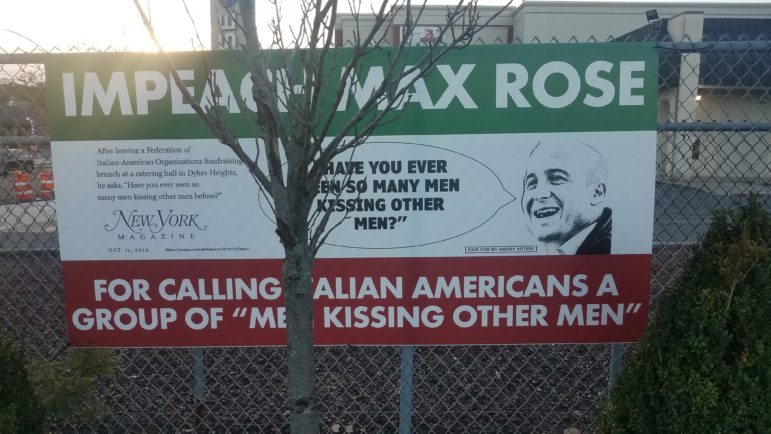
Across the Verrazzano Bridge in Bay Ridge, Brooklyn—also part of the 11th Congressional District—volunteers for Rose were posted at 72nd Street and 4th Avenue, asking passerbys if they voted and handing out campaign materials.
At the nearby polling station at 4th and Ovington avenues, a poll worker said there was a line early Tuesday morning, but by 10 a.m. voters were coming in and out of the location without a wait.
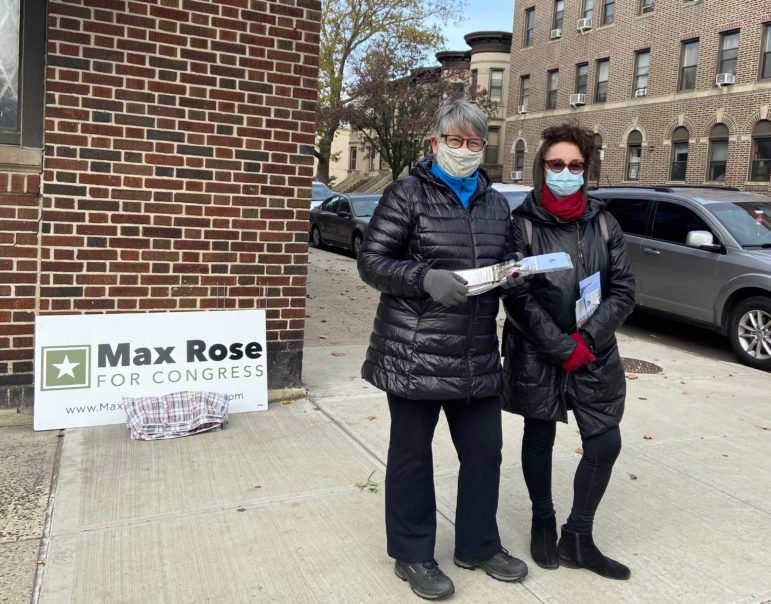
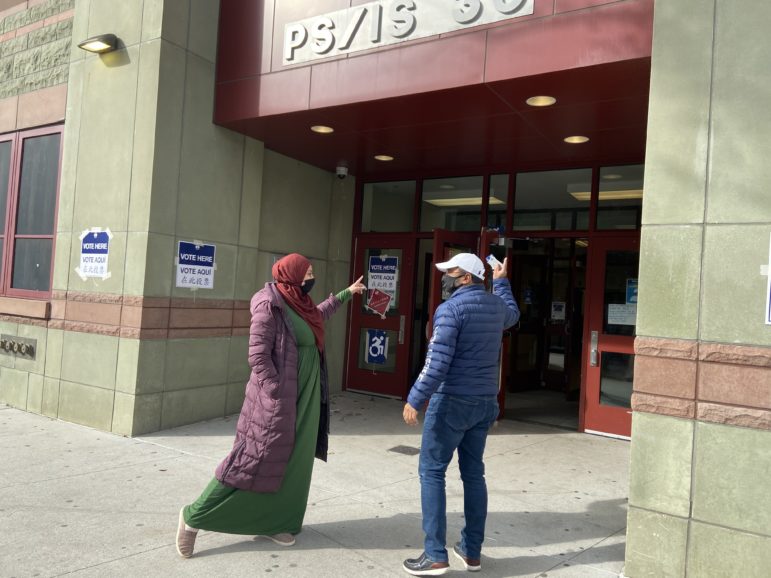
The scene was similar at Christ Church, on Ridge Boulevard and 74th Street, where a long line about 100 voters-deep had formed early Tuesday morning but moved quickly once polls opened.
Stephen Pickering, a Bay Ridge resident, posted himself near the site starting around 5:40 a.m. to campaign for Rose and for State Sen. Andrew Gounardes, who is facing challenger Vito Bruno to maintain the 22nd State Senate District seat.
He said he’s gotten “a lot of thumbs up” for the two democratic candidates from voters passing by. “Only a few shaking heads.”
On the other side of the political spectrum is Rosa Cerato, a Trump supporter and longtime Bensonhurst resident who was volunteering Thursday for the Malliotakis campaign. This is the first election, she says, where she is campaigning hard for a candidate.
“Democrats want to change our country to socialism. We don’t want big government. We want low taxes, freedom, school choice,” she said.
Alina Lewis, another volunteer for democrats Rose and Gounardes, said that while the neighborhood’s political races may have gotten heated this year, that discord hasn’t extended to the relations between she and her Bay Ridge neighbors.
“This neighborhood is divided politically, but it is a community,” she says.
“Before we saw our neighbor come by who is supporting Malliotakis. We already know because of our lawn signs. I would go to that neighbor if anything was wrong,” she added. “When people don’t know each other it’s easier to villainize each other.”
